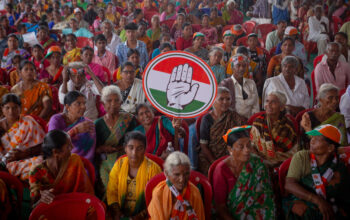
PARIS — France faces an unusual presidential election in seven weeks, with no credible left-wing contender, an electorate so disenchanted that abstention could be high, and a clear favorite who has not even announced his candidacy.
That favorite is President Emmanuel Macron, 44, who has opted to stay above the fray, delaying his decision to declare he is running until some time close to the March 4 deadline to do so, yet another way to indulge his penchant for keeping his opponents guessing.
Comfortable in his lofty centrist perch, Mr. Macron has watched as the right and extreme-right tear one another to shreds. Immigration and security have largely pushed out other themes, from climate change to the ballooning debt France has accumulated in fighting the coronavirus crisis.
“To call your child ‘Mohammed’ is to colonize France,” says Éric Zemmour, the far-right upstart of the election who has parlayed his notoriety as a TV pundit into a platform of anti-immigrant vitriol.
Only he, in his telling, stands between French civilization and its conquest by Islam and “woke” American political correctness. Like former President Donald J. Trump, to whom he spoke this week, Mr. Zemmour uses constant provocation to stay at the top of the news.
Still, Mr. Macron has a clear lead in polls, which give him about 25 percent of the vote in the first round of the election on April 10. Mr. Zemmour and two other right-wing candidates are in the 12 to 18 percent range. Splintered left-wing parties are trailing and, for now, seem like virtual spectators for the first time since the foundation of the Fifth Republic in 1958.
France generally leans right; this time it has lurched. “The left lost the popular classes, many of whom moved to the far right because it had no answer on immigration and Islam,” said Pascal Bruckner, an author and political philosopher. “So it’s the unknowable chameleon, Macron, against the right.”
The beneficiary of a perception that he has beaten the coronavirus pandemic and steered the economy through its challenges, Mr. Macron appears stronger today than for some time. The economy grew 7 percent in the last quarter. Unemployment is at 7.4 percent, low for France. The lifting of Covid-19 measures before the election, including mask requirements in many public places, seems probable, a step of potent symbolism.
It is a measure of the difficulty of attacking Mr. Macron that he seems at once to embody what is left of social democracy in France — once the preserve of a Socialist Party that is now on life support — and policies embraced by the right, like his tough stand against what he has called “Islamist separatism.”
“He is supple,” said Bruno Le Maire, the economy minister. Mr. Macron’s predecessor as president, François Hollande, a Socialist who feels betrayed by the incumbent’s shift rightward, put it less kindly in a recent book: “He hops, like a frog on water lilies, from one conviction to another.”
The two leading candidates in the first round go through to a second on April 24. The crux of the election has therefore become a fierce right-on-right battle for a second-place passage to a runoff against Mr. Macron.
Marine Le Pen, the perennial anti-immigrant candidate, has become Mr. Zemmour’s fiercest critic, as defections to him from her party have grown. She has said his supporters include “some Nazis” and accused him of seeking “the death” of her National Rally party, formerly called the National Front.
Mr. Zemmour, whose own extremist view is that Islam is “incompatible” with France, has ridiculed her for trying to distinguish between extremist Islamism and the faith itself. He has attacked her for not embracing the idea of the “great replacement” — a racist conspiracy theory that white Christian populations are being intentionally replaced by nonwhite immigrants, leading to what Mr. Zemmour calls the “Creolization” of societies.
The president would be confident of his chances against either Ms. Le Pen, whom he beat handily in the second round in 2017, or Mr. Zemmour, even if the glib intellectualism of this descendant of an Algerian Jewish family has overcome many of the taboos that kept conservative French voters from embracing the hard right.
France is troubled, with many people struggling to pay rising energy bills and weary from the two-year struggle against the pandemic, but a blow-up-the-system choice, like the vote for Mr. Trump in the United States or Britain’s choice of Brexit, would be a surprise.
Paulette Brémond, a retiree who voted for Mr. Macron in 2017, said she was hesitating between the president and Mr. Zemmour. “The immigration question is grave,” she said. “I am waiting to see what Mr. Macron says about it. He probably won’t go as far as Mr. Zemmour, but if he sounds effective, I may vote for him again.”
Until Mr. Macron declares his candidacy, she added, “the campaign feels like it has not started” — a common sentiment in a country where for now the political jostling can feel like shadow boxing.
That is scarcely a concern to the president, who has portrayed himself as obliged to focus on high matters of state. These include his prominent diplomatic role in trying to stop a war in Ukraine through his relationship with President Vladimir V. Putin of Russia, and ending, along with allies, the troubled French anti-terrorist campaign in Mali.
If Mali has been a conspicuous failure, albeit one that seems unlikely to sway many voters, the Ukraine crisis, as long as it does not lead to war, has allowed Mr. Macron to look like Europe’s de facto leader in the quest for constructive engagement with Russia. Mr. Zemmour and Ms. Le Pen, who between them represent some 30 percent of the vote, make no secret of their admiration for Mr. Putin.
One member of Mr. Macron’s putative re-election team, who insisted on anonymity per government practice, said the possibility of a runoff against the center-right Republican candidate, Valérie Pécresse, was more concerning than facing either Ms. Le Pen or Mr. Zemmour in the second round.
A graduate of the same elite school as Mr. Macron, a competent two-term president of France’s most populous region and a centrist by instinct, Ms. Pécresse might appeal in the second round to center-left and left-wing voters who regard Mr. Macron as a traitor.
Learn More About France’s Presidential Election
The campaign begins. French citizens will go to the polls in April to begin electing a president. Here is a look at the candidates:
But a disastrous performance in her first major campaign speech in Paris this month appears to have dented Ms. Pécresse’s chances, if perhaps not irretrievably. One poll this week gave her 12 percent of the vote, down from 19 percent in December.
Ms. Pécresse has been pushed right by the prevailing winds in France, the European country arguably worst hit by Islamist terrorism over the past seven years, to the point that she chose to allude to “the great replacement” in her campaign speech.
“Stop the witchcraft trials!” she said in a television interview on Thursday, in response to an outcry over her use of a term once confined to the extreme right. “I will not resign myself to a Macron-Zemmour duel,” because “voting for Le Pen or Zemmour is voting for Macron in the end.”
There have been two President Macrons. The first sought a reinvention of the state-centric French model through changes to the labyrinthine labor code that made it easier to hire and fire; suppression of the tax on large fortunes; and other measures to attract foreign investment and free up the economy.
Then came revolt, in the form of the Yellow Vest movement against rising inequality and globe-trotting financiers — Mr. Macron was once one — seen as blind to widespread social hardship.
No sooner had that quieted, than the coronavirus struck, turning the president overnight into a “spend whatever it takes” apostle of state intervention from a free-market reformer.
“We have nationalized salaries,” Mr. Macron declared in 2020, not blinking an eye.
The cost of all that will come due some day, and it will be onerous. But for now the “at the same time” president, as Mr. Macron has become known for his habit of constantly changing position, seems to bask in the glow of the pandemic tamed.
“He got lucky,” said the member of his campaign team. “Covid saved him from more unpopular reforms.”
Anything could still happen — a European war, a new variant of the virus, another major terrorist attack, a sudden wave of renewed social unrest — but for now, Mr. Macron’s aloof-from-the-melee waiting game seems to be working.
“Absent a catastrophe, I don’t see how Mr. Macon is not re-elected,” Mr. Bruckner said. Then again, the real campaign will only start when the incumbent descends at last into the turbulent arena.



